Introduction
Merchandising is a crucial aspect of retail that involves planning and promoting products to maximize sales. This practice ensures that the right products are available at the right time and place, appealing to customers' needs and preferences.
In this blog, we'll explore merchandising basics, its importance, and the key elements involved.
Types of Merchandising
Understanding the different types of merchandising helps retailers create effective strategies to attract and retain customers. Each type focuses on unique aspects of the customer experience, ensuring products are presented most appealingly.
Visual Merchandising
Visual merchandising involves creating attractive displays to engage customers.
Window Displays: A clothing store uses mannequins dressed in the latest styles to draw customers inside using visual merchandising.
Store Layout: By using visual merchandising, a grocery store arranges products logically, with fresh produce at the entrance to make a good first impression.
Lighting: A bookstore uses warm lighting to create a cozy atmosphere, encouraging customers to browse longer with the help of visual merchandising.
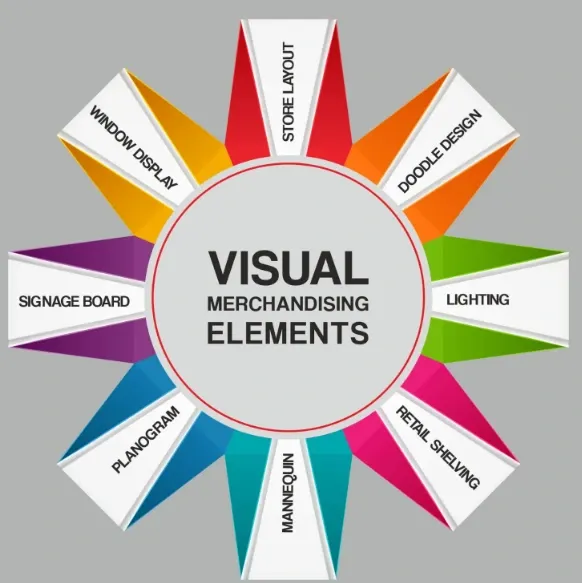
Retail Merchandising
Retail merchandising focuses on in-store product management and presentation.
Product Placement: In retail merchandising, supermarket places high-demand items at eye level to increase visibility and sales.
Promotional Signage: A pharmacy uses bright signs to highlight discounts and special offers, attracting more buyers in retail merchandising.
Inventory Management: An electronics uses retail merchandising in store to ensures popular gadgets are always in stock to meet customer demand.
Digital Merchandising
Digital merchandising applies to online stores, optimizing the virtual shopping experience.
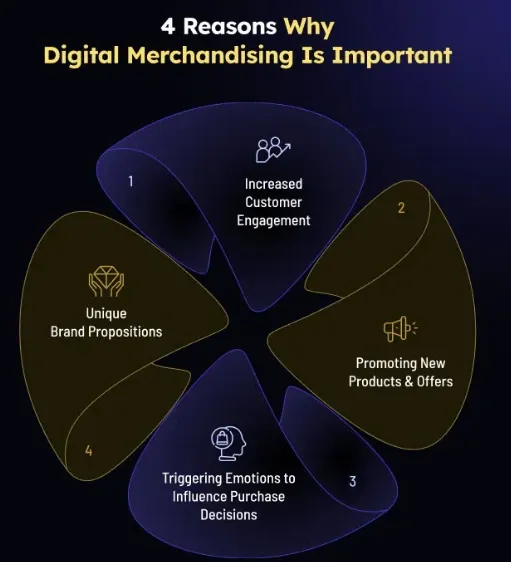
Website Design: An e-commerce site uses intuitive navigation and appealing visuals to keep visitors engaged.
Product Recommendations: A fashion website suggests items based on browsing history, enhancing the shopping experience.
Search Optimization: An online bookstore ensures books are easily found through effective search engine optimization.
Key Elements of Effective Merchandising
The key elements of effective merchandising are the following:
Product Display
Be it visual merchandising or retail merchandising, the right product display is important:
Eye-Catching Arrangements: A bakery uses tiered trays to display pastries, making them more appealing and accessible.
Themed Displays: A bookstore creates displays for different genres, helping customers find books that match their interests.
Interactive Displays: An electronics store sets up demo stations for customers to try out gadgets before purchasing.
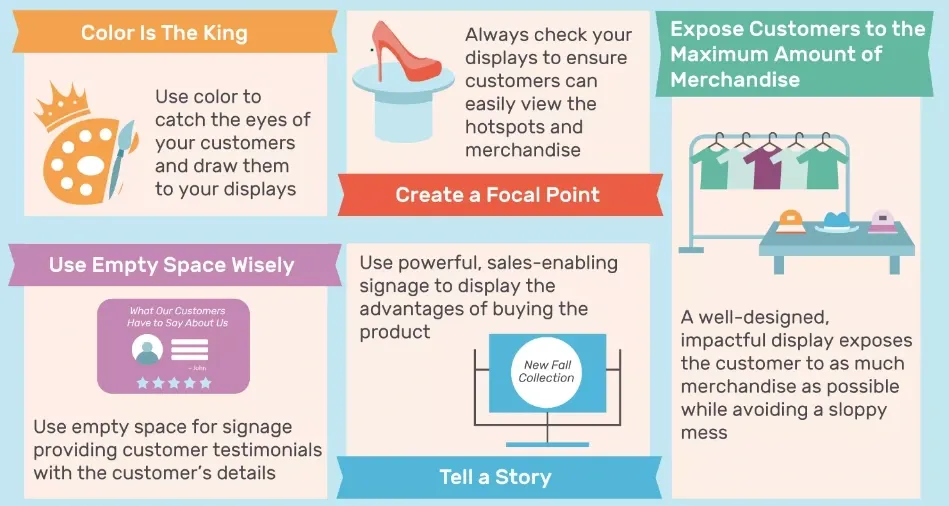
Store Layout
Store layout is another crucial element in both visual merchandising and retail merchandising:
Customer Flow: A grocery store arranges aisles to guide customers through high-margin sections first.
Zoning: A clothing store separates sections by clothing type and style, making it easier for shoppers to find what they need.
Flexibility: A furniture store frequently changes layouts to showcase new products and keep the space fresh.
Signage and Graphics
Signs and displays play an important role in merchandising:
Informative Signs: A pharmacy uses signs to clearly label aisles and sections, improving the shopping experience.
Promotional Banners: A department store hangs banners for sales and special offers, drawing attention to discounts.
Brand Consistency: A tech store uses consistent branding in signage to reinforce its identity and build customer trust.
Visual Merchandising Techniques
In this section, you’ll learn about the visual merchandising techniques.
Window Displays
In visual merchandising, window displays techniques work as:
Seasonal Themes: A fashion retailer uses seasonal themes to create engaging window displays that change with the seasons.
Storytelling: A toy store sets up windows to tell a story, capturing children's imaginations and drawing them in.
Highlighting New Arrivals: A shoe store showcases the latest styles in its window to attract fashion-conscious shoppers.
Suggested Reading:
Customer Engagement
Lighting
In visual merchandising, the technique of lighting works as:
Highlighting Products: A jewelry store uses spotlights to make diamonds sparkle and attract attention.
Creating Ambiance: A restaurant uses dim, warm lighting to create a cozy and inviting atmosphere.
Directional Lighting: A museum uses lighting to guide visitors through exhibits, enhancing their experience.
Color Schemes
In visual merchandising, color scheme techniques work as:
Brand Colors: A coffee shop uses its signature colors throughout the space to reinforce brand identity.
Mood Setting: A spa uses calming, neutral colors to create a relaxing environment for customers.
Contrasting Colors: A sports store uses bold, contrasting colors to highlight special offers and new products.
Retail Merchandising Strategies
In this section, you’ll learn about the retail merchandising strategies.
Shelf Placement
The strategy of shelf placement in retail merchandising works as:
Eye-Level Products: A supermarket places popular items at eye level to increase visibility and sales.
Impulse Buys: A convenience store places snacks and small items near the checkout to encourage last-minute purchases.
Logical Grouping: A home goods store groups related items together to make shopping more convenient.
Cross-Merchandising
The strategy of cross-merchandising in retail merchandising works as:
Complementary Products: A grocery store places pasta near sauces to encourage customers to buy both.
Bundling: An electronics store offers bundles of related products, such as a camera with accessories.
Themed Areas: A garden center creates themed areas with plants, tools, and decorations for different types of gardens.
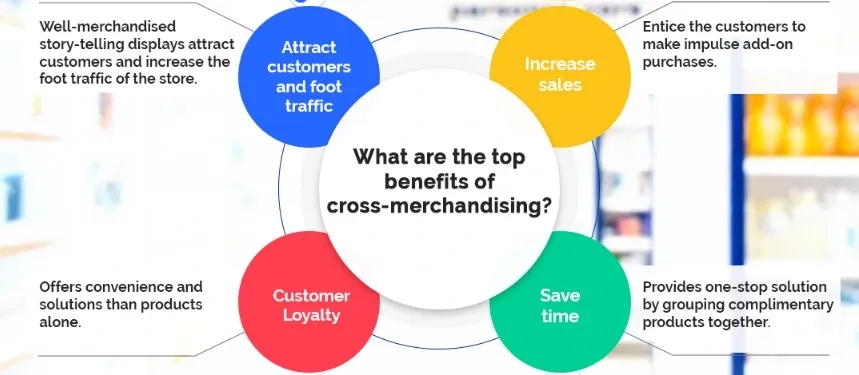
Seasonal Displays
The strategy of seasonal displays in retail merchandising works as:
Holiday Themes: A retail store creates displays for major holidays, attracting customers looking for seasonal items.
Event-Based Displays: A bookstore sets up displays for back-to-school season, featuring relevant books and supplies.
Changing Seasons: A clothing store rotates displays to feature winter coats in the colder months and swimsuits in the summer.
Suggested Reading:
Merchant Services Provider
Digital Merchandising Practices
In this section, you’ll learn about the digital merchandising practices.
Website Layout
The website layout is one of the best digital merchandising practices:
User-Friendly Navigation: An online store organizes products into clear categories, making it easy for customers to find what they need.
Featured Products: A homepage highlights bestsellers and new arrivals to draw customer attention.
Responsive Design: A retailer ensures its website works well on both desktop and mobile devices.
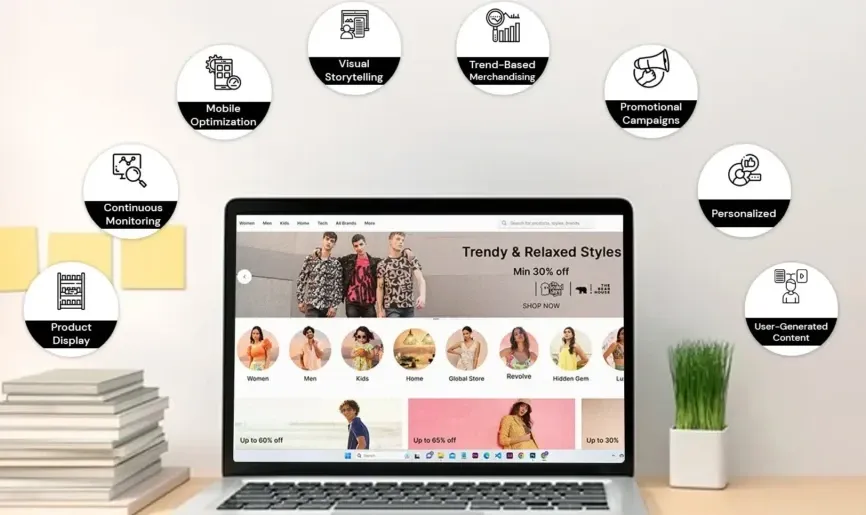
Product Descriptions
The product descriptions is one of the best digital merchandising practices:
Detailed Information: An online electronics store provides detailed specifications and usage information for each product.
Customer Reviews: A fashion website includes customer reviews to build trust and help shoppers make informed decisions.
High-Quality Images: An e-commerce site uses high-resolution images to showcase products from multiple angles.
Online Visuals
The online visuals is one of the best digital merchandising practices:
Video Demonstrations: An online beauty store uses videos to demonstrate how to use makeup products.
360-Degree Views: A furniture website offers 360-degree views of products to help customers visualize them in their homes.
Virtual Try-Ons: A glasses retailer uses virtual try-on technology to let customers see how frames will look on them.
Frequently Asked Questions (FAQs)
What is merchandising in retail?
Merchandising in retail involves planning, promoting, and presenting products to maximize sales and enhance the customer shopping experience.
Why is visual merchandising important?
Visual merchandising attracts customers, enhances the shopping experience, and increases sales by effectively displaying products and creating an appealing store environment.
How does digital merchandising work?
Digital merchandising optimizes the online shopping experience through effective website layout, detailed product descriptions, and engaging visuals like videos and high-resolution images.
What are the key elements of effective merchandising?
Effective merchandising includes product display, store layout, and signage and graphics to attract customers and encourage purchases.
What is cross-merchandising?
Cross-merchandising places complementary products together to encourage additional purchases, like placing pasta near sauces in a grocery store.
